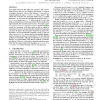Free Online Productivity Tools
i2Speak
i2Symbol
i2OCR
iTex2Img
iWeb2Print
iWeb2Shot
i2Type
iPdf2Split
iPdf2Merge
i2Bopomofo
i2Arabic
i2Style
i2Image
i2PDF
iLatex2Rtf
Sci2ools
204
click to vote
VLDB
2007
ACM
2007
ACM
Improving Data Quality: Consistency and Accuracy
Two central criteria for data quality are consistency and accuracy. Inconsistencies and errors in a database often emerge as violations of integrity constraints. Given a dirty database D, one needs automated methods to make it consistent, i.e., find a repair D that satisfies the constraints and "minimally" differs from D. Equally important is to ensure that the automatically-generated repair D is accurate, or makes sense, i.e., D differs from the "correct" data within a predefined bound. This paper studies effective methods for improving both data consistency and accuracy. We employ a class of conditional functional dependencies (CFDs) proposed in [6] to specify the consistency of the data, which are able to capture inconsistencies and errors beyond what their traditional counterparts can catch. To improve the consistency of the data, we propose two algorithms: one for automatically computing a repair D that satisfies a given set of CFDs, and the other for incremen...
Related Content
| Added | 05 Dec 2009 |
| Updated | 05 Dec 2009 |
| Type | Conference |
| Year | 2007 |
| Where | VLDB |
| Authors | Gao Cong, Wenfei Fan, Floris Geerts, Xibei Jia, Shuai Ma |
Comments (0)

